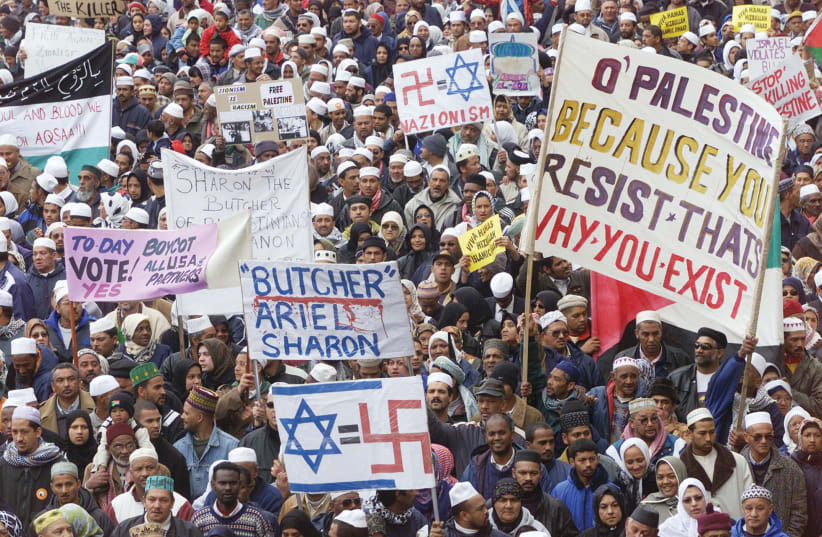It was a significant diplomatic victory for Israel that 34 countries stayed away from Durban IV, the UN General Assembly session on Wednesday that commemorated the 20th anniversary of the controversial UN World Conference against Racism in Durban, South Africa. But Israel should not rest on its laurels; it must build on and expand what appears to be a growing anti-Durban coalition.
Israel’s Ambassador to the UN Gilad Erdan noted that the number of nations boycotting Durban IV (34) was more than twice the number of countries that skipped the last Durban Review Conference in 2011 (14). Jerusalem had urged a boycott of the event due to its openly anti-Israel bias.
“Our demand that countries refuse to participate in the Durban process does not in any way contradict what must be our equally strong demand to speak up against racism wherever it appears,” Erdan said.
The United States, Canada, the UK, France, Germany, Lithuania and Hungary were among the states skipping this year’s gathering. French President Emmanuel Macron issued a statement saying, “Concerned by a history of antisemitic remarks made at the UN conference on racism, known as the Durban Conference, the President of the Republic has decided that France will not participate in the follow-up conference to be held this year.”
In Jerusalem, the Foreign Ministry denounced the conference as it got underway.
“The original Durban Conference, a UN-hosted event, became the worst international manifestation of antisemitism since WWII,” its statement said. “Inflammatory speeches, discriminatory texts and a pro-Hitler march that took place outside the halls were only part of the ugliness displayed in 2001.”
Twenty years after the so-called World Conference on Racism, some of the same organizations that attended the first Durban parley have waged what has become known as a Boycott, Divestment and Sanctions (BDS) campaign against the only democracy in the Middle East, but they have failed, the Foreign Ministry said.
Reviewing the two decades since Durban I, the General Assembly adopted a resolution that pledged “to accelerate momentum to make the fight against racism... a high priority.”
“People of African descent, minority communities, indigenous peoples, migrants, refugees, displaced persons, and so many others – all continue to confront hatred, stigmatization, scapegoating, discrimination and violence,” declared Secretary-General António Guterres. “Xenophobia, misogyny, hateful conspiracies, white supremacy and neo-Nazi ideologies are spreading, amplified in echo chambers of hate.”
While the world is witnessing “a troubling rise” in antisemitism, anti-Muslim bigotry and the mistreatment of minority Christians, Guterres urged all member states to condemn discrimination, hateful speech and baseless assertions that he said denigrate “our essential fight against racism.”
The UN chief’s call is justified and pertinent, and the Jewish state, created in the wake of the worst racial genocide in history, the Holocaust, should be part of the international struggle against racism and other forms of hatred.
But the anti-Israel, antisemitic narrative that was given legitimacy in the first Durban conference, despite the partial boycott of this year’s session, remains very much with us.
As Rowan Polovin, the national chairman of the South African Zionist Federation, wrote in an op-ed in The Jerusalem Post, “The outcome of Durban was the launch of a global, organized and well-funded antisemitic machine, masked in the language of human rights and cloaked in the guise of anti-apartheid activism” known as BDS.
The BDS movement, which has chalked up several victories in recent years, has also suffered several setbacks, such as the decision by several US states from Arizona to Florida to divest from Ben & Jerry’s over its decision to cease sales in Israeli settlements.
Twenty years after Durban I, Polovin pointed out, “Israel is stronger, secure, richer, more loved and more respected than ever before.”
Rather than allowing itself to be portrayed in some parts of the world as “a racist, apartheid state,” Israel and its allies should seize the historical moment and stand together – including the Gulf states with which it recently celebrated the anniversary of the Abraham Accords – to lead the international struggle against racism and religious persecution.
Rather than needing to lead a boycott of world conferences on racism, the Jewish state should have a special place at the table.

